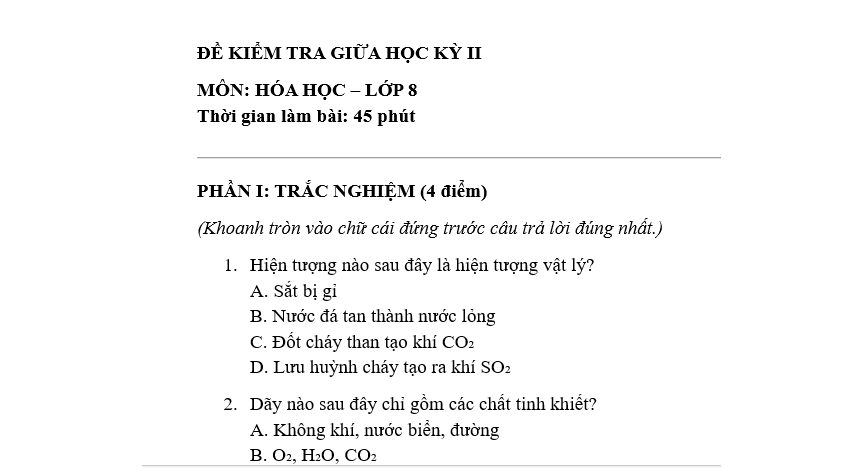What are the newest 2nd mid-semester question papers for 8th-grade Chemistry in 2025? What are the requirements regarding specific competencies in the Natural Sciences curriculum in Vietnam?
What are the newest 2nd mid-semester question papers for 8th-grade Chemistry in 2025?
Below are the newest 2nd mid-semester question papers and answers for 8th-grade Chemistry in 2025:
Download the 2nd mid-semester question papers for 8th-grade Chemistry
Download the 2nd mid-semester question papers for 8th-grade Chemistry

Note: The information is for reference only!

What are the newest 2nd mid-semester question papers for 8th-grade Chemistry in 2025? Requirements for specific competencies in natural sciences?
What are the requirements regarding specific competencies in the Natural Sciences curriculum in Vietnam?
Under the General Education Program for Natural Sciences issued with Circular 32/2018/TT-BGDDT, the requirements regarding specific competencies in the Natural Sciences curriculum in Vietnam are specifed as follows:
The Natural Sciences subject helps students develop natural science competencies, including three main components: understanding natural science, exploring nature, and applying learned knowledge and skills. Specifically, the manifestations of each component capacity are presented as follows:
Understanding Natural Science
Students have the ability to present and explain core knowledge about structures, diversity, systematics, motion rules, and interactions within the natural world. Specific manifestations include:
Recognizing and naming objects, phenomena, concepts, and natural laws.
Presenting characteristics, roles of objects, and phenomena using spoken or written language, diagrams, charts, formulas, etc.
Classifying, comparing, analyzing features of objects and phenomena according to certain criteria.
Using keywords, scientific terms, connecting information, and outlining when reading and presenting scientific texts.
Explaining relationships between natural phenomena (cause-effect relationships, structure-function, etc.).
Detecting errors and making adjustments, while also providing critical assessments.
Exploring Nature
Students perform basic skills to explore and explain natural phenomena in reality, simultaneously proving issues with scientific evidence. Specific manifestations include:
Proposing issues and asking questions: Identify problems, ask questions, analyze the context to propose issues based on existing knowledge.
Building hypotheses: Analyze the issue, make predictions, and state hypotheses for research.
Planning the implementation: Build exploration content logically, choose suitable methods (observation, experimentation, investigation, interview, etc.), and plan deployment.
Executing the plan: Collect and process data, evaluate results based on statistical parameters, compare with hypotheses, and draw conclusions.
Reporting and discussing: Express research results through text, diagrams, charts, write scientific reports, discuss and defend viewpoints.
Making decisions and proposing solutions: Make decisions and propose solutions for the researched issues.
Applying Learned Knowledge and Skills
Students apply natural science knowledge to explain natural phenomena, environmental issues, sustainable development, as well as find ways to solve life-related problems. Specific manifestations include:
Recognizing and explaining real-world issues based on scientific evidence.
Proposing and implementing solutions for environmental protection, adapting to climate change, and aiming for sustainable development.
What are the perspectives on developing the Natural Sciences curriculum in Vietnam?
Under the General Education Program for Natural Sciences issued with Circular 32/2018/TT-BGDDT, the perspectives on developing the Natural Sciences curriculum in Vietnam are as follows:
The Natural Sciences curriculum concretizes the objectives and requirements of the General Program while emphasizing the following viewpoints:
Integrated Teaching
The Natural Sciences curriculum is designed based on the integrated teaching viewpoint. Natural sciences form a unified field in terms of objects, methods of perception, common concepts, and principles, so teaching should help students recognize this unity. Moreover, a competence-oriented approach, linked with practical situations, requires integrated teaching. The Natural Sciences curriculum also integrates and blends various educational content such as technical education, health education, environmental protection education, sustainable development, etc.
Inheritance and Development
The Natural Sciences curriculum ensures the inheritance and development of the strengths of existing subject curricula in Vietnam while absorbing the experience of building natural science programs in advanced educational systems worldwide. It ensures close connection among classes and articulation with the curriculum of Natural and Social Sciences, Science at the primary level, Physics, Chemistry, Biology at the high school level, and vocational education programs.
Comprehensive Education
The Natural Sciences curriculum contributes to forming and developing students’ qualities and capabilities through educational content with fundamental, practical knowledge and skills, showing a comprehensive, modern, and updated nature. It emphasizes practice, application of knowledge, and skills to solve problems in study and life through educational methods and forms that promote each student's initiative and potential. Assessment methods are suitable for educational objectives, ensuring the development of student capabilities across educational levels, facilitating transition between educational phases, and laying the foundation for lifelong learning.
Combining Theory with Practice and Suitability with Vietnam's Reality
Through practical activities in laboratories and in real life, the Natural Sciences curriculum helps students firmly grasp theories while also enabling them to apply scientific knowledge and skills to real-life situations.
The curriculum focuses on knowledge content close to students' daily lives, enhancing the application of scientific knowledge and skills to real-life situations, contributing to developing students' adaptability in an ever-changing world.
The Natural Sciences curriculum ensures feasibility and suitability with resources such as teachers, time, physical facilities, etc., to implement the program.

